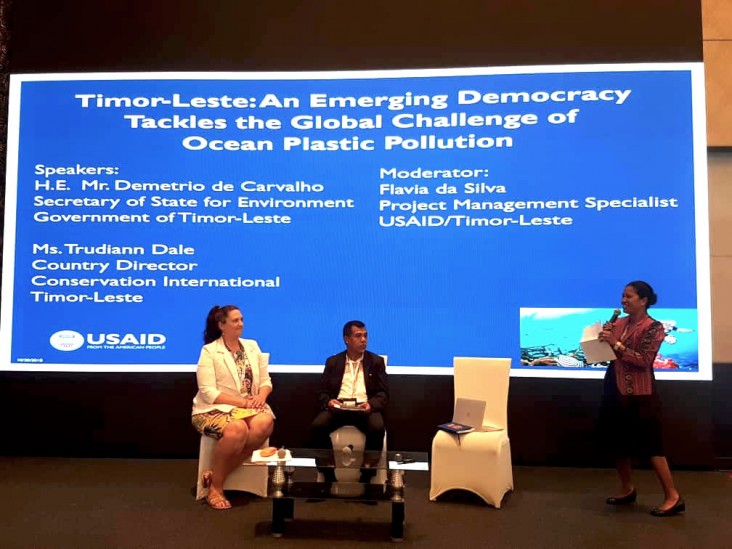Press Release Shim
Speeches Shim

An Emerging Democracy Tackles A Global Problem
For Immediate Release
NUSA DUA, BALI, INDONESIA – The developing island nation of Timor-Leste is moving to ban single-use plastic products and pledges to recycle all plastic waste by 2030, the country’s secretary of state for environment said in an Ocean Talk led by The United States Agency for International Development (USAID) at the Our Oceans Conference 2018 (OOC2018) here.
USAID/Timor-Leste’s Ocean Talk, “Timor-Leste: An Emerging Democracy Tackles the Global Challenge of Ocean Plastic Pollution,” also featured a screening of “The Sea That Sustains Us,” a film produced by USAID/Timor-Leste that illustrates the issue of ocean plastics pollution through the experiences of regular Timorese who are affected by it. USAID’s film was one of more than $52 million in new commitments announced by the United States at the conference to promote ocean conservation for sustainable blue economies.
USAID/Timor-Leste Project Management Specialist Flavia da Silva led the OOC2018 discussion featuring Secretary of State for Environment Demetrio do Amaral de Carvalho and Trudiann Dale, country director for Conservation International in Timor-Leste, which is helping implement the policy. Timor-Leste is one of the world’s newest democracies, having emerged from a struggle for independence 16 years ago. It faces tough development challenges, such as health, education and poverty, but Carvalho said the country also recognized the threat of plastic pollution and needed to address it.
“In Dili (the capital) alone, daily waste production is growing rapidly from 190 tons in 2015 to 200 tons in 2018. If we continue with this trend, by 2030 we will produce 400 tons of daily waste,” he said, noting a recent study concluded plastic waste accounts for 20 percent of total waste and can easily end up in the ocean.
“If we all agree that our ocean is our legacy, it means the choice is in our hands. I call on all of you distinguished guests to please join me to leave behind to our future generations a healthy and productive ocean,” he said.
The USAID film and subsequent OOC2018 participation stemmed from a 2017 agency-funded study by the National Oceanic and Atmospheric Administration that labeled the near-shore Timor-Leste waters among the most biodiverse in the world.
“Our Ocean Conference was an excellent opportunity for USAID/Timor-Leste to highlight its work on the protection of Timor-Leste’s marine biodiversity and for the government of Timor-Leste to discuss its recently introduced zero plastics policy,” da Silva said.
Hosted by Indonesia this year, Our Ocean originated five years ago from the United States Department of State. The conference focuses on generating commitments from world governments and other organizations for maintaining ocean sustainability. The conference reported about US$18 billion in commitments and about 12.4 million square kilometers of ocean selected for marine protected areas since its inception in 2014.

Comment
Make a general inquiry or suggest an improvement.